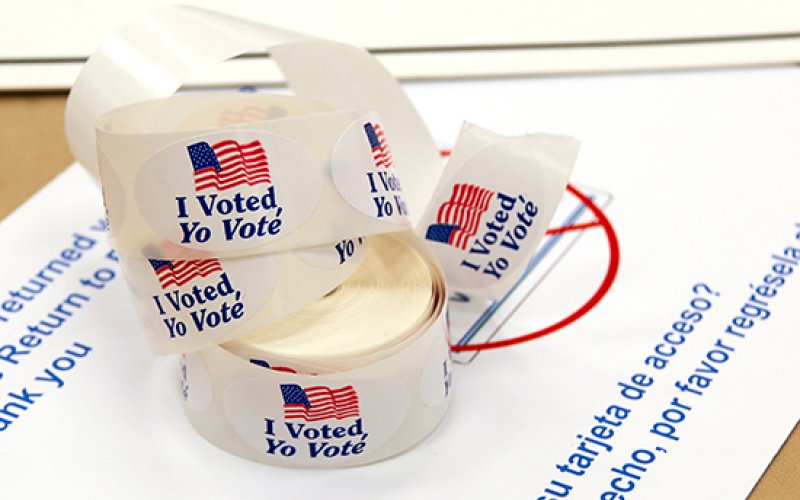Experts Weigh in as Presidential Election Enters Final Week

The U.S. Presidential Election will be held on Nov. 3, however early voting has started in several states.
ALBANY, N.Y. (Oct. 28, 2020) – As the United States enters the final week of the 2020 Presidential election on Nov. 3, UAlbany faculty are closely following election-related issues and how they may impact the race for the Presidency.
While the economy and COVID-19 remain top concerns among voters, the controversy surrounding the recent confirmation of Supreme Court Associate Justice Amy Coney Barrett, absentee voting and the polarized state of the U.S. electorate remain important issues as voters head to the polls.
Associate Professor of History Carl Bon Tempo, who teaches courses in 20th century American political history, is monitoring how the election will shape President Donald Trump's legacy as he seeks another four-year term.
"President Trump’s term has been noteworthy: A massive tax cut, a reworking of immigration policies, the addition of three justices to the Supreme Court, impeachment, and direction of the federal government’s response to a pandemic that has killed at least 220,000 Americans," said Bon Tempo. "And President Trump has never ceded the spotlight. Thus, the 2020 presidential election is, without question, a referendum on President Trump’s conduct, leadership, and accomplishments during the last four years.
"If elected, Joe Biden has an opportunity to start to undo some of the moves made by President Trump and his Republican allies on Capital Hill. A President Biden will have interesting choices and challenges here. But Biden also acknowledges that he is a transitional figure in the Democratic Party, and part of his presidency will involve shaping the future of the Democrats," continued Bon Tempo. "Presidents do not control their own destiny. The shape of politics in the next four years will be dictated not only by who controls the White House, but who controls Congress, especially the Senate."
Professor of Political Science Michael Malbin, who specializes in campaigns and elections, is looking at the numbers and dates that are important in this year's election cycle.
"Dec. 8: This is the day set in federal law for states to certify who will be their electors. The Electoral College meets and votes only six days later," said Malbin. "This is significant in 2020 because of the prospect that large numbers absentee ballots means it will be hard to do the initial counts, recounts, and go through legal challenges before that date occurs. Interestingly, these states could include Pennsylvania, Michigan, and Wisconsin, where the states cannot begin counting until Election Day.
"This is the key deadline for the most likely election disputes of 2020," continued Malbin. "But remember that the states with potential disputes will be important only if the rest of the states do not add up to 270."
Professor of Political Science and Women's Studies Julie Novkov, whose research and teaching are situated at the intersection of law, history, U.S. political development, and subordinated identity, is monitoring how the death of Supreme Court Justice Ruth Bader Ginsburg and the subsequent nomination and confirmation of newly seated Justice Barrett will impact voters.
"The confirmation is likely to increase the salience of the courts as an issue in the election, including for Democratic voters– not just for Republicans as in 2016," said Novkov. "Barrett’s rapid confirmation makes it possible for her to play a role in post-election litigation. A large victory by the Democrats will open up possibilities for a number of potential reforms to the Supreme Court and the lower federal courts."
Assistant Professor of Political Science Stephan Stohler, whose research and teaching interests are in the areas of public law and comparative politics, is tracking the potential for a tie in the Electoral College, and how that process would play out if the Presidency were to be decided by Congress.
"In any constitution, the most important provisions include the rules for selecting the head of government. The U.S. Constitution, in the Twelfth Amendment, outlines those procedures outlines the procedures for selecting a President and Vice President in the event of a tie in the Electoral College," said Stohler. "If such an event were to occur, then the incoming members of the U.S. House of Representatives, voting in their state delegations, would select the President from among the top-three Electoral College presidential candidates.
"Currently, Republicans control a majority of state delegations (26) in the House, though Democrats are not far behind (23), and the Pennsylvania delegation is tied," continued Stohler. "These numbers will likely change after Election Day on Nov. 3, making it too difficult to predict with certainty how these state delegations would vote once the new House is seated. That said, even though an Electoral College tie is unlikely, it is not altogether improbable if President Trump slightly outperforms his current polling averages in key states on Election Day. Therefore, we should be well aware of the Twelfth Amendment’s instructions and the contingencies which might arise because of the Electoral College and our unusual way of selecting the President and Vice President."




